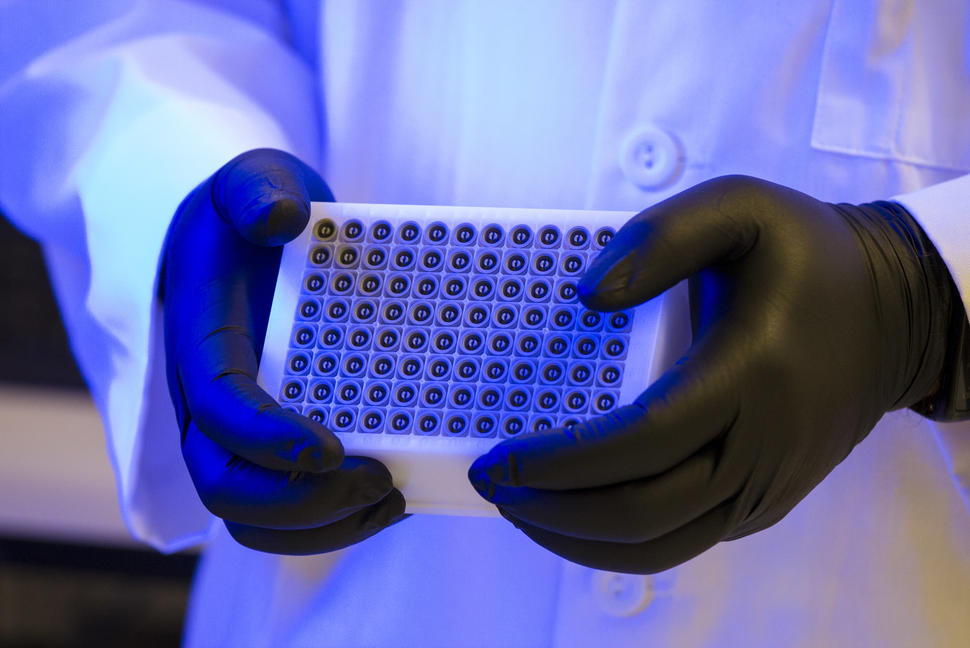The CDP works closely with the MoCha Lab staff at the Frederick National Laboratory for Cancer Research (FNLCR) because it provides instrumental support to DCTD for many initiatives.
MoCha offers genomic characterization of biospecimens obtained from patients with cancer in DCTD-supported clinical trials including:
- NCI’s large precision medicine initiatives (i.e., MATCH, Pediatric MATCH, ComboMATCH, iMATCH, and MyeloMATCH)
- Experimental Therapeutics Clinical Trials Network trials through the National Clinical Laboratory Network (NCLN)
- Developmental Therapeutics Clinic (DTC) trials
Core genomic assays supported by MoCha include whole exome sequencing, RNA sequencing, the TSO500 ctDNA assay for liquid biopsies, and several targeted gene panels profiling cancer-related genes. MoCha has additionally developed a targeted sequencing assay with a rapid turnaround time for the MyeloMATCH trial. It has expertise in the cutting-edge GeoMx and Visium digital spatial profiling platforms, as well as workflows for single-cell RNA sequencing and T-cell receptor sequencing.
MoCha is playing a critical role in NCI’s Molecular Diagnostics Network, a network of CLIA-certified laboratories providing molecular assays in support of MyeloMATCH, ComboMATCH, and iMATCH precision medicine initiatives.
Molecular Diagnostics Network (MDNet)
MDNet trials are building upon NCI-MATCH/PedsMATCH and NCLN experience and are establishing an assay network for support of NCI’s Precision Medicine Trials Initiative. The three trials ongoing under the MDNet initiative are iMATCH, ComboMATCH, and MyeloMATCH. MoCha lab is a designated lab for the integral assays for the MDNet trials.
Cancer Moonshot Biobank (CMB)
MoCha is supporting NCI’s Cancer MoonshotSM Biobank (CMB), which aims to bank tumor and blood from ~1000 patients enrolled through NCI’s Community Oncology Research Program (NCORP) and National Clinical Trial Network (NCTN). Patients receiving standard-of-care therapy may enroll at diagnosis, while they are being treated, or at progression. MoCha provides state-of-the-art NGS testing at diagnosis and again at relapse to to help the treating physician potentially identify clinically actionable mutations that might inform a patient’s next course of therapy.
National Clinical Laboratory Network (NCLN)
The MoCha Lab is the genomics hub for of the National Clinical Lab Network (NCLN). The NCLN was established to support the Experimental Therapeutics Clinical Trials Network by providing centralized, robust assays following harmonized and locked SOPs that are analytically validated and performed in CLIA accredited facilities. The NCLN utilizes a centralized specimen biorepository and the support of centralized data reporting.
NCI’s Patient-Derived Model Repository (PDMR)
The MoCha Lab provides histology, pathology and genomic support for the NCI PDMR program. This program has so far generated over 1000 patient-derived mouse, cellular and organoid models for the research community. All genomic data generated by MoCha is available through a public-facing website.
Cutting-Edge Genomic Technologies
Digital Spatial Technologies is an emerging field that integrates histology and transcriptomics to generate spatially resolved gene expression data within tissue sections. This approach is essential for understanding the intricate interactions between cells and their microenvironment. MoCha houses two key spatial technology platforms, GeoMx and Visium, which are being utilized as exploratory assays in ongoing clinical trials.
Additionally, Digital Pathology is a rapidly evolving innovation at MoCha, supporting the Patient-Derived Model Repository, Cancer Moonshot Biobank, and various ETCTN trials. Recently, MoCha has developed supervised AI algorithms for tumor purity assessment, nuclear and cell surface biomarker evaluation, and tissue microarray analysis for research applications. The development of novel algorithms and applications remains an ongoing priority, further expanding the potential of digital pathology in translational and clinical research.
Key Support for Public and Private Initiatives
In partnership with NCI, MoCha has provided important support for public/private initiatives from the Friends of Cancer Research (Friends) and from the Foundation for the National Institutes of Health (FNIH).
Foremost among these was the FNIH circulating tumor (ctDNA) Quality Control Materials (QCMs) project, an effort spearheaded by FNIH that focused on the development and qualification of standards for ctDNA. MoCha played a lead role in the project, which was executed in three phases. Phase 1, a qualification of the QCMs in 4 core labs, was published in 2021. Phase 2, a functional characterization of the QCM, and Phase 3, a real-world clinical pilot in 11 clinical labs, have recently been completed and the results submitted for publication.
MoCha made key contributions to Friends’ Tumor Mutational Burden (TMB) Harmonization project. The goal was to evaluate how different laboratories assess TMB, an important predictive biomarker, and to develop approaches to better align TMB measurements between labs. MoCha also made important contributions to Friends’ Homologous Recombination Deficiency (HRD) Harmonization project, an effort to evaluate how different laboratories assess HRD, a complex biomarker of clinical importance for ovarian and other cancers.
